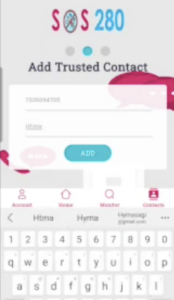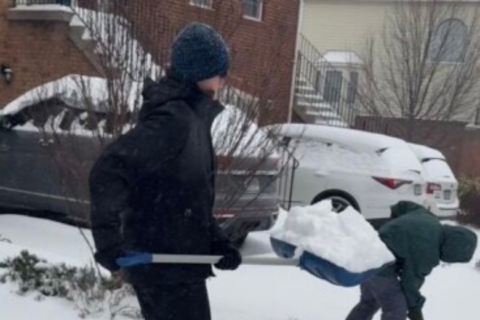Two Virginia siblings have taken their social media and technology skills to a new level, creating an app to help those at risk of substance abuse that has been adopted by a national nonprofit.
“It’s a really good feeling,” said Abhinav Potineni, 16, a junior at Rockridge High School in Loudoun County.
Abhinav and his 13-year-old sister, Cheluvi, from Stone Hill Middle School, created the app SOS280.

They came up with the idea after the relative of a family friend was struggling with performance-enhancing drugs.
“When we heard that story, we were really shook. We decided that something had to be done,” Cheluvi said.
The app uses Twitter and Instagram to flag posts that may indicate substance abuse. This is reflected in the name of the app, as users are limited to 280 characters in a Tweet.
“It then looks at keywords for those drug names, or like alternate synonyms for those drugs,” Abhinav said.
And then?
“It will send out a message saying, hey, this person who identified you as a trusted contact said that they’re potentially at risk of a substance abuse situation,” Abhinav said.
“The overall function of the app is to prevent substance abuse situations, using machine learning to monitor social media history and then notify the family members if they’re potentially at risk through text or GPS.”
The sibling duo won third place in the Congressional App Challenge in Virginia District 10.
They presented their app to Rep. Jennifer Wexton, who conducted the award ceremony virtually on Jan. 8. Wexton said she is proud of students building apps with potential to address real world problems.
“Don’t stop coding and innovating,” Wexton said in a letter shared by Abhinav and Cheluvi. “Young minds like you are the blueprint for our district’s and country’s future.”
The first place app went to Thomas Jefferson High School students Sauman Das, Sameer Gabbita, Arnav Jain and Vishal Kothka for their app titled Ichos, designed to offer access to healthcare for resource-poor health systems.
The Ichos app team will have an opportunity to present their app at #HouseofCode on Capitol Hill this spring.
Second-place went to Bridging Up, creates by team members Max Wang and Michelle Wang. It’s an app designed to “eliminate toxicity by promoting understanding and dissuading attention-seeking behavior and a platform that focuses on building communities instead of tearing them down,” the letter explains.
The SOS208 app is currently available on Google Play and Abhinav says they are working to get it in the Apple App Store in the next couple of weeks.
The app is now featured on the tool kit for addiction survivors of the nonprofit To Write Love on Her Arms, which has a reach of 3 million addiction survivors.
The siblings partnered with the nonprofit Faces and Voices of Recovery, with a reach of 23 million, to get feedback during the app design phase. The app will be featured on their blog site soon.
On top of coding in spare time, the siblings run the nonprofit Coding Made Accessible, which is working on bridging the gender gap, diversity gap and socioeconomic gap in the STEM field.
The nonprofit aims to empower students in our programs to be STEM ambassadors in their communities through mentoring and hands-on learning. So far, they have partnered with three housing authorities in Maryland, including the Howard County Housing Commission, Anne Arundel County Housing Commission and the Housing Authority of the City of Frederick.








